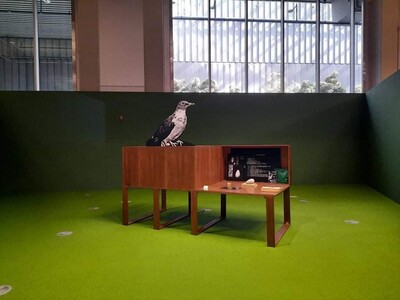Group Exhibition Asia Culture Center, Gwangju, South Korea
Posthuman Ensemble, referring to “posthuman” individuals coming together in an “ensemble,” is an exhibition that seeks to investigate how humans can emerge from a human-centered thought to exist in harmony with other nonhuman beings. ACC FOCUS, an annual exhibition that centers on important issues every year, focused on the actions of artists constantly invoking the memory of the environment and the history as struggles at the boundaries that form the equilibrium of the ecosystem for its 2020 exhibition, Equilibrium. This year’s Posthuman Ensemble exemplifies ACC’s participation in the efforts of those who think about the new meaning of posthuman and “new identity,” in the world left in the wake of a global pandemic, as a counterstrike by nature.
The word “posthuman” often brings up associations of the interface between humans and machinery. This is because of the more familiar concept of “transhumanism,” which focuses on the combination of humans with machinery in order to go beyond the ability of human in the vein of cyborgs such as Bionic Woman or Six Million Dollar Man and the like, formed during the 1950s and 1960s with the increasing focus on artificial intelligence (AI) and computing. Researchers of the “posthuman” have expanded their focus not only to encompass the familiar fields of transhumanism but also to include the “nonhuman” and humanity’s relationship with those categorized as not human.
These efforts present a starting point for examining what the values we, as humanity, can pursue as “posthuman” in the Anthropocene period, an age where humanity’s actions, as the masters of the world, lead the climate change and environmental damages. A piece of stone, a blade of grass—everything that exists around us, or defined by us as meaningless, actually exists in relationship with each and every action taken by the human. Even the artificial ones created by humanity and the humanity itself can be seen as existing in a relationship of mutual exchange with nature in the grand cycle of the ecosystem. The network between the human and the nonhuman has already been established, and all species in the ecosystem are circulating in it. Posthuman Ensemble seeks to recognize the existence of different types of nonhumans and propose a new nonhuman existence of “emotionality.”
Ultimately, it seeks to raise the questions on how humanity should understand its relationships with the nonhuman and communicate in that relationship. Thus, the exhibition first includes numerous beings that do not hold the attention of most humans, the ones that are deemed insignificant by humans, such as weed, fungi, and discarded items in the city. Second, it includes the unseen and the known, such as cells and viruses. Third, it includes emotions, which are a part of humanity but are not recognized by science as concrete, in the category of the nonhuman. In particular, the exhibition seeks to interpret the process involved in the interpretation of human emotions, transition of the interpretation of data, and actualization and objectification thereof by the machine being equipped with ever-developing AI technology through an idea of “translation,” and thus the concept behind the communication involved in it.
Ultimately, the exhibition examines how the two parties relate to and communicate with each other and thus achieve a harmonious coexistence based on mutual respect rather than superiority, and in that relationship of coexistence, how humanity can receive healing and solace from the nonhuman. The exhibition is constructed in a way that suggests whether the posthuman, to develop the gathering of the human and the nonhuman toward the configuration of an ensemble, should examine the wounded emotions of the human and the nonhuman not through the lens of charity, but rather through empathy, humility, and respect, in the age of the COVID-19 pandemic. That starts with the recognition of the nonhumans’ existence and their dignity as equal beings and will ultimately serve as an asset that the human can imbue the AI, hitherto seen with fear for its capacity to surpass and rule over the human.
Curated by Rue Young Ah (Asia Culture Institute, Senior Curator).
More Pictures:




